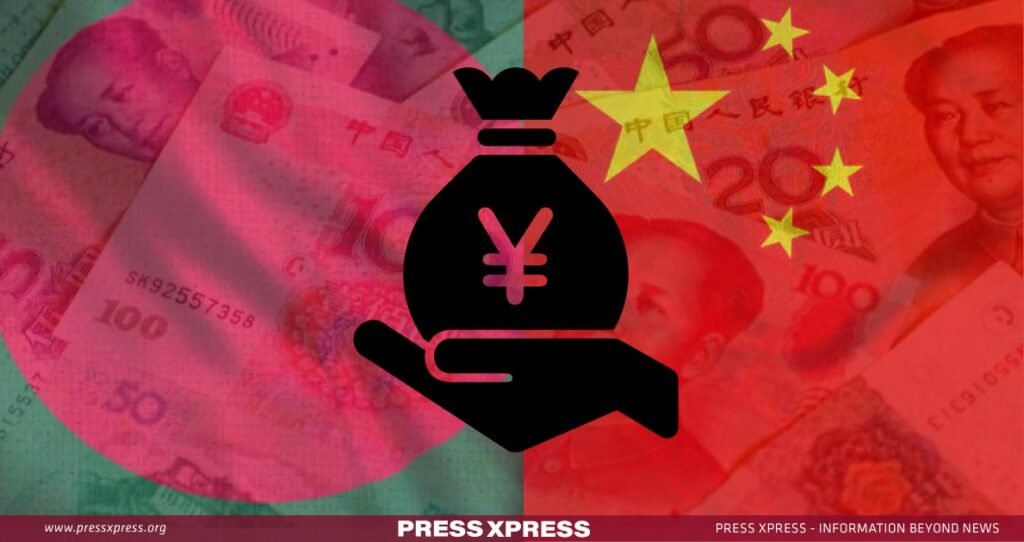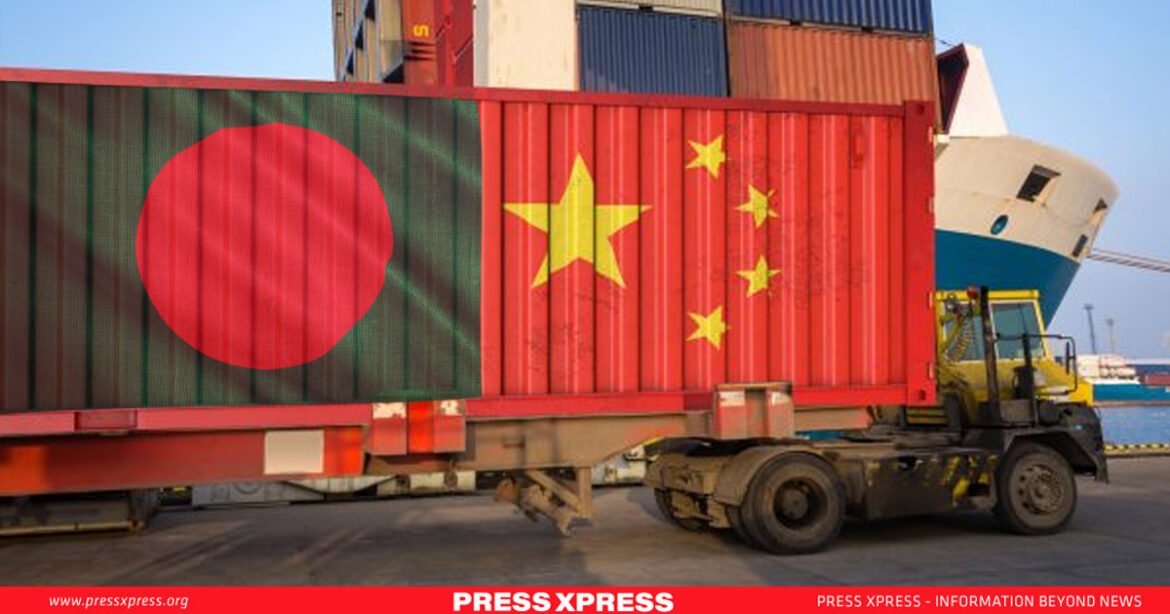Due to various systemic and strategic challenges, Bangladesh encounters formidable barriers to fully capitalizing on its duty-free access to China, the world’s second-largest economy. Business leaders argue that securing a Free Trade Agreement (FTA) with China is imperative to bolster Bangladeshi exports.
A recent study by the Research and Policy Integration for Development (RAPID) underscores Bangladesh’s potential to accrue an additional $27 billion through enhanced exports of diversified, high-quality goods to China, achieving a mere 1% market share. However, the study identifies critical impediments hindering such progress.
You Can Also Read: Bangladesh’s Diplomatic Chessboard: The Significance of Hasina’s Upcoming Visit to China
Chief among these challenges is Bangladesh’s heavy reliance on the ready-made garment (RMG) sector. Despite China’s substantial $10 billion imports of garments, Bangladesh struggles to meet stringent quality standards essential for sustained export growth.
China’s Preference for High-Quality European Garments
“China dominates garment exports to the USA, EU, and UK, while Bangladesh relies overwhelmingly on garments, constituting 84% of its exports,” highlighted Dr. MA Razzaque, Chairman of RAPID.
Experts emphasized China’s preference for high-quality garments from Italy and other European nations, importing approximately $10 billion annually in such products. To penetrate the Chinese market effectively, Bangladesh must diversify its export base and elevate product standards. For this, Bangladesh needs the urgency of proactive policies, including attracting investments targeted at Chinese market demands and forging robust trade agreements.
Additional barriers identified include:
- – Limited integration with Chinese retailers
- – Inadequate engagement in marketing, sales, and post-sales services
- – Cultural and language disparities
- – Stringent Chinese packaging and labeling regulations
Chinese products often undercut Bangladeshi counterparts of similar quality. The rapid growth of China’s e-commerce sector further complicates matters, necessitating enhanced skills among Bangladeshi entrepreneurs to effectively tap into this dynamic market.
Proposing a strategic solution, and incentivizing Chinese investors to establish manufacturing facilities in Bangladesh is imperative. These facilities could produce goods for export both to China and other global markets, thereby amplifying Bangladesh’s export potential.
Bangladesh Eyes Chinese Investments to Bridge Trade Gap
In anticipation of Prime Minister Sheikh Hasina’s forthcoming state visit to Beijing from July 8 to 10, Bangladesh is poised to host a significant trade and investment summit. Anticipation surrounds that attracting Chinese factories to Bangladesh will substantially augment the country’s exports to China.
Presently, Bangladesh imports approximately $24 billion annually from China, while its exports to China remain modest, falling short of $1 billion. Addressing this trade disparity, Bangladesh aims to entice Chinese investments through compelling incentives in sectors such as ceramics, leather, pharmaceuticals, electric vehicles, premium garments, and household appliances.
Focus Sectors for Chinese Investments:
- Ceramics
- Leather
- Pharmaceuticals
- Electric vehicles
- Premium garments
- Household appliances
Realizing Bangladesh’s full export potential to China hinges on strategic diversification, elevating product standards, and forging robust bilateral trade agreements.
Contrasting Trends
According to data from the Export Promotion Bureau (EPB), Bangladesh’s exports to Japan amounted to $1.69 billion in the July-May period of the last fiscal year, rising to $1.90 billion in the fiscal year 2022-23. Similarly, exports to India totaled $1.67 billion in the July-May period of the last fiscal year and increased to $2.12 billion in fiscal year 2022-23.
In contrast, exports to China reached $761.02 million in the July-May period of the last fiscal year and declined slightly to $677.35 million in the fiscal year 2022-23. Despite the availability of zero-duty benefits for 98% of Bangladeshi products, exports to China have not witnessed substantial growth. Nevertheless, China has emerged as Bangladesh’s largest import destination, with annual imports exceeding $23 billion, as per data from the Ministry of Commerce.
In 2015, China extended trade benefits to least developed countries (LDCs), encompassing up to 97 percent of their goods, later increased to 98 percent for Bangladesh. China’s share in Bangladesh’s imports surged from 10.3 percent in FY02 to 26.4 percent in FY22. By FY23, imports from China soared from under $1 billion to over $23.5 billion, crucial for Bangladesh’s export growth, domestic industries, and consumer goods.
Export Trends to Key Markets (July-May Period):
Japan:
FY 2021-22: $1.69 billion
FY 2022-23: $1.90 billion
India:
FY 2021-22: $1.67 billion
FY 2022-23: $2.12 billion
China:
FY 2021-22: $761.02 million
FY 2022-23: $677.35 million
A significant portion of these imports arrive through duty-free bonded warehouses, predominantly serving the export industry. However, despite these developments, Bangladesh faces challenges in diversifying its exports to China.
Yuan Trade Potential
Currently, Bangladesh captures merely 0.04 percent of China’s import market, a fraction that, if increased to just 1 percent, could yield export earnings exceeding $26 billion, Razzaque’s study suggests. Comparatively, Vietnam commands an 18 percent share of China’s garment market, underscoring Bangladesh’s room for growth.
Moreover, despite the authorization for trade in Yuan, issued by Bangladesh Bank in September 2022, its full potential remains untapped, largely due to limited adoption by local banks and businesses.

Looking ahead, the prospect of expanding trade relations with China through enhanced Yuan transactions holds promise for alleviating economic pressures and fostering sustainable growth.
In a recent interview, Bangladesh Bank Governor Abdur Rouf Talukder disclosed Bangladesh’s request for a 36 billion Yuan loan (approximately $5 billion) from China to alleviate the country’s reserve crisis and cover import expenses. This loan, to be denominated in Chinese Yuan, aims not only to address foreign exchange shortages but also to fund crucial imports from China, a topic expected to feature prominently during Prime Minister Sheikh Hasina’s upcoming visit to Beijing.
Loan Talks Focus on Yuan Benefits
Technical negotiations on the loan terms have already commenced between the two nations. Loans denominated in Chinese Yuan typically feature lower interest rates, as reflected in the Shanghai Interbank Offered Rate (Shibor), which contrasts favorably against the Secured Overnight Financing Rate (SOFR) applicable to dollar-denominated loans.
While the Chinese Yuan holds IMF recognition as one of the world’s major currencies, transactions in the Yuan alongside the Taka would mark a significant step forward if implemented.
Contrasting the challenges faced with transactions in Indian Rupees, where international acceptance remains limited, the international acceptance and reduced risk associated with Yuan transactions are deemed beneficial for Bangladesh. The adoption of the Yuan in trade is growing globally, echoing business community sentiments for easing dollar pressures and simplifying transactions between Bangladesh and China.


